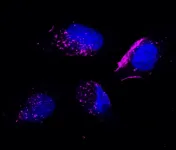(Press-News.org) Alternative splicing is a genetic process where different segments of genes are removed, and the remaining pieces are joined together during transcription to messenger RNA (mRNA). This mechanism increases the diversity of proteins that can be generated from genes, by assembling sections of genetic code into different combinations. This is believed to enhance biological complexity by allowing genes to produce different versions of proteins, or protein isoforms, for many different uses.
New research from the University of Chicago suggests that alternative splicing may have an even greater influence on biology than just by creating new protein isoforms. The study, published this week in Nature Genetics, shows that the biggest impact of alternative splicing may come via its role in regulating gene expression levels.
The research team, led by Yang Li, PhD, Benjamin Fair, PhD, and Carlos Buen Abad Najar, PhD, analyzed large sets of genomic data, covering various stages from early transcription to when RNA transcripts are destroyed by the cell. They saw that cells produced three times as many “unproductive” transcripts—RNA molecules with mistakes or unexpected configurations—as when they analyzed steady-state, finished RNA only.
Unproductive transcripts are quickly destroyed by a cellular process called nonsense-mediated decay (NMD). Li’s team calculated that on average, about 15% of transcripts that are started are almost immediately degraded by NMD; when they looked at genes with low expression levels, that number went up to 50%.
“We thought that was a huge breakthrough,” said Li, who is an Associate Professor of Medicine and Human Genetics. “It already seems wasteful to degrade 15% of mRNA transcripts, but no one would have thought that the cell is transcribing so much and getting rid of the errors immediately, seemingly without any purpose.”
Why would the cell fire up its genetic production machinery to immediately trash 15 to 50% of its output? And why would transcription make so many mistakes in the first place?
“We think it’s because NMD is so efficient,” Li said. “The cell can afford to make mistakes without damaging things, so there’s no selective pressure to make fewer mistakes.”
But Li suspected there must also be some purpose for such a widespread phenomenon. His team conducted a genome wide association study (GWAS) to compare gene expression levels across different cell lines. They found many variations at genetic locations that are known to affect the level of unproductive splicing. These loci were just as often associated with differences in genetic expression caused by NMD as they were with differences in production of multiple protein isoforms.
Li believes cells sometimes purposely select transcripts doomed for NMD to decrease expression levels. If the nascent RNA is destroyed before it gets fully transcribed, it will never produce proteins to execute biological functions. This effectively silences the genes, like deleting an email draft before its writer can press send.
“We found that genetic variations that increase unproductive splicing often decreased gene expression levels,” Li said. “This shows that there this mechanism must have some effect on expression, because it is so widespread.”
The team found that many variants linked to complex diseases are also associated with more unproductive splicing and decreased gene expression. So, they believe that better understanding its impact could help develop new treatments that leverage the alternative splicing-NMD process. Drug molecules could be designed to decrease the amount of unproductive splicing, and thus increase gene expression. One approved drug for spinal muscular atrophy already takes this approach to restore proteins that are being shut off. Another approach could be to increase the NMD process to decrease expression, for example in rampant cancer genes.
“We think we can target a lot of genes because now we know how much this process is going on,” Li said. “People used to think that alternative splicing was mainly a way to make an organism more complex by generating different versions of proteins. Now we’re showing that it might not be its most important function. It could be simply to control gene expression.”
The study, “Global impact of unproductive splicing on human gene expression levels and traits,” was supported by funding from the National Institutes of Health (grants R01GM130738, R01HG011067, and R35GM147498), a GREGoR Consortium Grant and the W. M. Keck Foundation.
Additional authors include Junxing Zhao, Austin Reilly, Gabriela Mossian, Jonathan P Staley, and Jingxin Wang from the University of Chicago, and Stephanie Lozano from the University of California, Davis.
END
How cells control gene expression by cleaning up their mistakes
New research from the University of Chicago shows that alternative splicing plays a much bigger role than expected in controlling gene expression.
2024-09-02
ELSE PRESS RELEASES FROM THIS DATE:
Global South cities lack cooling green spaces
2024-09-02
Cities in the Global South are more exposed to extreme heat because they lack cooling green spaces, new research shows.
The study found that Global South cities have just 70% of the “cooling capacity” provided by urban greenery in the Global North.
With temperatures rising, combined with the “urban heat island” effects that make cities hotter than rural areas, heat-related illness and death in cities are becoming more common.
Urban green spaces can help reduce this risk, cooling down outdoor environments and providing vital refuges.
The research – led by an international team including Nanjing, Exeter, Aarhus and North Carolina State universities – ...
The risk of global water scarcity is greater when accounting for the origin of rain.
2024-09-02
Securing the world's water supply is one of the greatest challenges of our time. Research at Stockholm University is now presenting an alternative method for quantifying the global risk of water scarcity. Results indicate higher risks to water supply than previously expected if accounting for the environmental conditions and governability where rain is produced.
The common idea of global water supply is rain falling on the earth's surface and then stored in aquifers, lakes, and rivers. This idea is usually used to assess water security and the risk of water scarcity. However, a new study published in Nature Water shows how the water risks are dependent on governance ...
New pharmaceutically active substances from billions of newly combined molecules
2024-09-02
Nowadays, there’s lots of buzz about spectacular new medical treatments such as personalised cancer therapy with modified immune cells or antibodies. Such treatments, however, are very complex and expensive and so find only limited application. Most medical therapies are still based on small chemical compounds that can be produced in large quantities and thus at low cost.
Billions of new molecules in just a few weeks
The bottleneck in the development of new molecular therapies is the limited number of new active ...
The dark side of egg donation: racial discrimination in fees and unspoken health risks
2024-09-02
White women are paid up to eight times more for their eggs than Black women in the US, according to data uncovered by the author of a new book which exposes the lesser-known ramifications of egg donation.
Eggonomics by Diane M. Tober reveals statistics and stories which illuminate the rarely-told, complex realities of egg donation, and airs personal accounts of disturbing power imbalances within the industry. She takes a microscope to the industry across the globe, but in particular in the U.S. and Spain.
Donor disparities
Tober finds ...
Wearable heart monitor increases diagnosis of irregular heart rhythm
2024-09-01
DURHAM, N.C. – Wearable, long-term continuous heart monitors helped identify 52% more cases of atrial fibrillation compared to usual care, but that did not lead to a reduction in hospitalizations due to stroke, according to a study led by the Duke Clinical Research Institute.
The findings, reported Sept. 1 at the European Society of Cardiology meeting and published in the Journal of the American College of Cardiology, provide inconclusive data about whether atrial fibrillation screening lowers stroke rates. The COVID pandemic led to an early halt of the study before fully enrolling, so it did not ...
Singapore scientists to use exosomes secreted by living cells to successfully target TKI-resistant cancer
2024-09-01
Singapore, 2 September 2024 – In a new study, clinician-scientists and researchers from the National Cancer Centre Singapore (NCCS) have demonstrated the use of exosomes to successfully target squamous cell cancer tumours that are usually resistant to epidermal growth factor receptor-tyrosine kinase inhibitors (EGFR-TKIs). Their research is the first where exosomes have been applied to target TKI-resistant cancers in Singapore. The findings were published in the journal Developmental Cell last month.
Epidermal growth factor receptor, also known as EGFR, is a biomarker ...
Brigham-led clinical trial finds finerenone reduces worsening heart failure and cardiovascular death
2024-09-01
Finerenone reduced the composite of total first and recurrent heart failure (HF) events (hospitalizations for HF or urgent HF visits) and cardiovascular death in patients with HF and mildly reduced or preserved ejection fraction, according to an international clinical trial led by investigators from Brigham and Women’s Hospital, a founding member of the Mass General Brigham healthcare system. Heart failure events and cardiovascular death were less common in the finerenone group than in the placebo group. Overall, the rate of serious adverse events was similar across the groups, but rates of hyperkalemia—elevated levels of potassium in the blood—were higher for the ...
SGLT2 inhibitor empagliflozin is shown to be safe and effective for treating patients who have suffered a heart attack
2024-09-01
The SGLT2 inhibitor empagliflozin confers kidney-protective benefits and can therefore be given safely and effectively to patients when they are hospitalized for acute myocardial infarction (MI), a Mount Sinai-led global team of researchers has shown.
The team, led by Deepak L. Bhatt, MD, MPH, MBA, Director of the Mount Sinai Fuster Heart Hospital and the Dr. Valentin Fuster Professor of Cardiovascular Medicine at the Icahn School of Medicine at Mount Sinai, performed a secondary analysis of the results from a worldwide trial known as EMPACT-MI. They also demonstrated that empagliflozin can consistently reduce heart failure events ...
Potassium supplementation and prevention of atrial fibrillation after cardiac surgery
2024-08-31
About The Study: For atrial fibrillation after cardiac surgery prophylaxis, supplementation only when serum potassium concentration fell below 3.6 mEq/L was noninferior to the current widespread practice of supplementing potassium to maintain a serum potassium concentration greater than or equal to 4.5 mEq/L. The lower threshold of supplementation was not associated with any increase in dysrhythmias or adverse clinical outcomes.
Corresponding Author: To contact the corresponding author, Benjamin O’Brien, MD, PhD, email Ben.OBrien@dhzc-charite.de.
To ...
Low-dose triple-pill vs standard-care protocols for hypertension treatment in Nigeria
2024-08-31
About The Study: Among Black African adults with uncontrolled hypertension, a low-dose triple-pill protocol achieved better blood pressure lowering and control with good tolerability compared with the standard-care protocol.
Corresponding Author: To contact the corresponding author, Anthony Rodgers, PhD, email arodgers@georgeinstitute.org.
To access the embargoed study: Visit our For The Media website at this link https://media.jamanetwork.com/
(doi:10.1001/jama.2024.18080)
Editor’s Note: Please see the article for additional information, including other authors, author contributions and affiliations, ...
LAST 30 PRESS RELEASES:
Scientists identify smooth regional trends in fruit fly survival strategies
Antipathy toward snakes? Your parents likely talked you into that at an early age
Sylvester Cancer Tip Sheet for Feb. 2026
Online exposure to medical misinformation concentrated among older adults
Telehealth improves access to genetic services for adult survivors of childhood cancers
Outdated mortality benchmarks risk missing early signs of famine and delay recognizing mass starvation
Newly discovered bacterium converts carbon dioxide into chemicals using electricity
Flipping and reversing mini-proteins could improve disease treatment
Scientists reveal major hidden source of atmospheric nitrogen pollution in fragile lake basin
Biochar emerges as a powerful tool for soil carbon neutrality and climate mitigation
Tiny cell messengers show big promise for safer protein and gene delivery
AMS releases statement regarding the decision to rescind EPA’s 2009 Endangerment Finding
Parents’ alcohol and drug use influences their children’s consumption, research shows
Modular assembly of chiral nitrogen-bridged rings achieved by palladium-catalyzed diastereoselective and enantioselective cascade cyclization reactions
Promoting civic engagement
AMS Science Preview: Hurricane slowdown, school snow days
Deforestation in the Amazon raises the surface temperature by 3 °C during the dry season
Model more accurately maps the impact of frost on corn crops
How did humans develop sharp vision? Lab-grown retinas show likely answer
Sour grapes? Taste, experience of sour foods depends on individual consumer
At AAAS, professor Krystal Tsosie argues the future of science must be Indigenous-led
From the lab to the living room: Decoding Parkinson’s patients movements in the real world
Research advances in porous materials, as highlighted in the 2025 Nobel Prize in Chemistry
Sally C. Morton, executive vice president of ASU Knowledge Enterprise, presents a bold and practical framework for moving research from discovery to real-world impact
Biochemical parameters in patients with diabetic nephropathy versus individuals with diabetes alone, non-diabetic nephropathy, and healthy controls
Muscular strength and mortality in women ages 63 to 99
Adolescent and young adult requests for medication abortion through online telemedicine
Researchers want a better whiff of plant-based proteins
Pioneering a new generation of lithium battery cathode materials
A Pitt-Johnstown professor found syntax in the warbling duets of wild parrots
[Press-News.org] How cells control gene expression by cleaning up their mistakesNew research from the University of Chicago shows that alternative splicing plays a much bigger role than expected in controlling gene expression.


